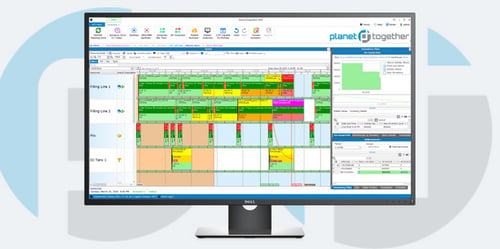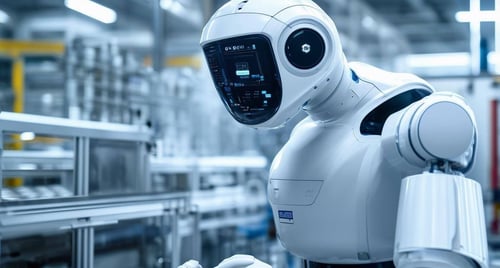Adopting Automation and Robotics in Medical Manufacturing: A Supply Chain Revolution
The medical manufacturing industry is evolving rapidly, driven by stringent regulatory requirements, growing market demand, and technological advancements. Supply Chain Managers in medical manufacturing facilities are at the forefront of these changes, tasked with ensuring efficiency, compliance, and resilience. One of the most transformative shifts in recent years has been the adoption of automation and robotics across production and supply chain operations.
As automation and robotics take center stage, the ability to seamlessly integrate these technologies with existing enterprise systems—such as PlanetTogether and ERP solutions like SAP, Oracle, Microsoft, Kinaxis, and Aveva—becomes essential. This integration not only enhances operational efficiency but also provides the visibility and agility required to maintain a competitive edge.
In this blog, we explore how automation and robotics are reshaping medical manufacturing supply chains and the critical role that advanced planning and scheduling (APS) solutions play in this transformation.
The Case for Automation in Medical Manufacturing
Automation and robotics are not just futuristic concepts—they are already revolutionizing supply chains in medical manufacturing. The sector is uniquely positioned to benefit from these technologies due to its need for precision, quality control, and compliance with regulatory bodies like the FDA and ISO.
Key Drivers of Automation Adoption:
- Regulatory Compliance – Automated tracking and documentation ensure adherence to strict industry regulations.
- Product Quality and Consistency – Robotics minimize human errors and ensure consistency in production.
- Workforce Challenges – Addressing labor shortages and reducing dependency on manual processes.
- Increased Productivity – Faster production cycles lead to improved order fulfillment rates.
- Supply Chain Resilience – Automation enhances real-time decision-making and risk mitigation strategies.
These benefits make it clear why many medical manufacturers are prioritizing automation and robotics in their supply chain strategies.

Where Automation Meets the Supply Chain
Supply Chain Managers play a critical role in ensuring the smooth integration of automation into existing workflows. From procurement and inventory management to production scheduling and distribution, automation technologies streamline operations at multiple levels.
Automated Inventory and Demand Forecasting
One of the biggest pain points for medical manufacturers is inventory management. The integration of PlanetTogether with SAP, Oracle, Microsoft, Kinaxis, or Aveva enables real-time tracking of raw materials, work-in-progress (WIP), and finished goods. By leveraging AI-driven forecasting, supply chain teams can:
Predict fluctuations in demand based on historical and real-time data.
Optimize raw material procurement to avoid shortages or excess inventory.
Automate reordering processes to maintain optimal stock levels.
For example, integrating PlanetTogether APS with SAP allows manufacturers to automate material requirements planning (MRP) and dynamically adjust production schedules based on inventory levels.
Robotics in Warehouse and Distribution Centers
The deployment of autonomous mobile robots (AMRs) and automated guided vehicles (AGVs) in warehouses is transforming the way medical manufacturers handle logistics. These robots streamline picking, packing, and shipping operations, reducing lead times and improving accuracy.
When PlanetTogether APS integrates with ERP solutions like Kinaxis, it provides real-time updates on production schedules, enabling warehouse automation systems to dynamically adjust order fulfillment processes. This eliminates bottlenecks and enhances distribution efficiency.
AI-Driven Production Scheduling and Workflow Optimization
Modern robotics systems require intelligent scheduling to maximize efficiency. By integrating PlanetTogether APS with Microsoft Dynamics 365, manufacturers can:
Automate job scheduling based on resource availability and priority orders.
Optimize machine utilization, reducing downtime and increasing throughput.
Implement predictive maintenance strategies to prevent unexpected failures.
For instance, robotic-assisted assembly lines can work in tandem with APS-generated schedules to execute production plans with minimal delays and maximum accuracy.
Quality Control Through Automated Inspections
Medical manufacturing demands rigorous quality assurance to ensure patient safety. Vision-based robotic inspection systems equipped with AI-powered analytics can detect defects in medical devices with unmatched precision.
By connecting PlanetTogether with Aveva, manufacturers can create a closed-loop quality management system where:
Data from automated inspection systems feed directly into APS for real-time adjustments.
Quality control metrics automatically trigger rework processes for defective products.
Digital twins simulate process optimizations before real-world implementation.
This results in fewer recalls, reduced waste, and improved compliance with industry standards.

Challenges in Automation Adoption and How to Overcome Them
While automation brings undeniable benefits, its implementation can present several challenges. Supply Chain Managers must be proactive in addressing these hurdles:
Integration with Legacy Systems
Many manufacturers operate with legacy ERP systems that were not designed for automation. The key to overcoming this challenge is leveraging middleware solutions that bridge the gap between legacy software and modern robotics. PlanetTogether’s APS system acts as a central hub, synchronizing data from various sources for seamless planning and execution.
Change Management and Workforce Adaptation
Automating processes often leads to concerns about workforce displacement. To mitigate this:
Focus on upskilling employees to work alongside automation technologies.
Implement collaborative robotics (cobots) that enhance human productivity rather than replace jobs.
Provide training programs that prepare employees for new, technology-driven roles.
Data Security and Compliance
Automated systems generate vast amounts of sensitive data. Ensuring compliance with HIPAA, FDA 21 CFR Part 11, and ISO 13485 is crucial. By integrating automation with secure, cloud-based ERP solutions like SAP or Oracle, manufacturers can enforce robust cybersecurity and access controls to protect data integrity.
For Supply Chain Managers in medical manufacturing, the adoption of automation and robotics is no longer optional—it’s a requirement for maintaining efficiency, quality, and compliance. By integrating PlanetTogether with leading ERP platforms like SAP, Oracle, Microsoft, Kinaxis, and Aveva, manufacturers can unlock new levels of productivity and responsiveness.
Are you ready to take your manufacturing operations to the next level? Contact us today to learn more about how PlanetTogether can help you achieve your goals and drive success in your industry.
Topics: PlanetTogether Software, Integrating PlanetTogether, Workflow Optimization, Medical Manufacturing, Automated Inventory and Demand Forecasting, AI-Driven Production Scheduling, Robotics in Warehouse and Distribution Centers, Quality Control Through Automated Inspections





















LEAVE A COMMENT